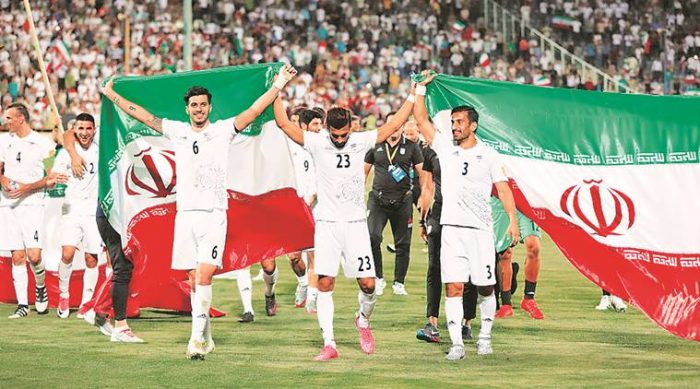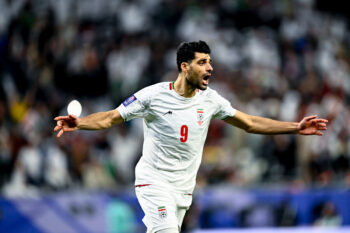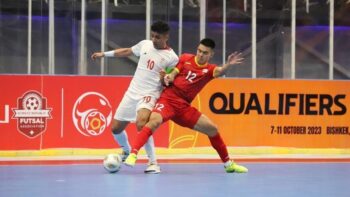Morocco – Iran preview: Do or die for Africa’s and Asia’s finest

Persianfootball.com – ST. PETERSBURG, When the 2018 World Cup group B opener between Morocco and Iran will come to a close on Friday evening, at least one of the teams can already bury their dreams of reaching the knockout stage.
Either side will need three points from the clash to stand a chance in a group with reigning European champions Portugal, led by Cristiano Ronaldo, and World Cup favourites Spain.
This could make the game opener and more exciting to watch for neutral spectators, who actually would have to fear a goalless draw, considering the defensive record of the two teams as both sides were the most impressive in their continent’s World Cup qualifying.
Impressive defensive lines
Morocco cruised through the final stage of World Cup qualifying unbeaten and with no goals conceded in a group with highly favoured Ivory Coast. Similarly, Iran qualified unbeaten as well, only conceding two goals in their meaningless final qualifier, however, only after having set a new World record on minutes without conceding a single goal beforehand.
With Juventus defender Medhi Benatia, the Africans have a player with world class quality in defense, mainly responsible for their defensive strength. Besides his qualities as a footballer, Benatia is the undisputed leader of this team. His partner in central defense, Romain Saiss of English Championship side Wolverhampton, doesn’t have the same quality, but is nevertheless a solid defender.
Fullback Achraf Hakimi of Real Madrid, who can be utilized on either side, has lots of attacking power, but lacks experience. Same goes for Lille’s Mendyl, which is why Renard might use one of his many good midfielders as full-back in his 4-1-4-1. With Nabil Dirar, who usually plays in midfield for Fenerbahce, not fully fit, Nordin Amrabat might be pulled back to defense, such as tried in Morocco’s most recent friendly.
Iran on the other hand don’t have any defensive player in a European top league. While the two offensive minded full-backs Ramin Rezaeian and Milad Mohammadi play their trade in Belgium and Russia, Morteza Pouraliganji, who plays in Qatar, is Iran boss Carlos Queiroz’s only center-back option not playing in Iran’s domestic league. Who will partner the fixed man in the center, is one of the key questions.
With veteran Jalal Hosseini not included in the squad and meanwhile 34-year-old Pejman Montazeri, the only defender with experience from the 2014 World Cup in the roster, being slightly past his prime, it seems the often critisized Rouzbeh Cheshmi will get the nod instead of Mohammad-Reza Khanzadeh and youngster Majid Hosseini. Cheshmi, 1.92 cm tall and often playing as defensive midfielder at club level, defintely adds strenghth in the air and good passing ability to the backline, but has displayed himself error-prone in the national team.
However, the qualifying campaign, where Queiroz repeatedly changed his defensive personell, has shown that Iran’s defensive strength is rather derived from good teamwork and tactical discipline, rather than being dependent on certain players.
No shortage of creativity
Yet, both sides feature a lot of creative power too. Morocco especially impresses in midfield: led by defensive midfielder Karim El Ahmadi and playmaker Hakim Ziyech, both displaying their impressive skills in the Eredivisie, coach Hervé Renard also has plenty other good midfielders at his disposal: Galatasaray’s Younes Belhanda, Al Jazeera’s veteran Mbark Boussoufa and Leganes’ Nordin Amrabat bring lots of experience, while Schalke’s Amine Harit is an additionally available talent. Especially threating is Morocco’s aggressive pressing approach, which is supposed to kill off the opposition’s build-up early.
But Iran have much talent and experience in midfield as well, also without the suspended Saeid Ezatollahi. His replacement is one of the key decisions Queiroz has to make. With Cheshmi bound for defense and the experiment with Masoud Shojaei not going exactly perfectly, Esteghlal veteran Omid Ebrahimi might be the defensive midfielder of choice in the classic 4-3-3.
Although the version with the technically gifted AEK Athens playmaker as number 6 is still thinkable, Shojaei is more likely to fill the right central midfield position, whereas Olympiacos man Ehsan Hajsafi is a certain starter left to him. Ashkan Dejagah, who lacks match praxis and is struggling with fitness is more an option from the bench, while the sometimes tried alternative with striker Karim Ansarifard as central midfielder also might still be on the table.
Ansarifard could also appear on the left-wing, should Mehdi Taremi not be 100% fit, after sustaining a light injury in Iran’s final friendly match, but the Al Gharaffa striker appears to have fully recovered though contradicting information on his state of fitness is coming from the Iranian camp. Alternatively, Swedish-based Saman Ghoddos or Persepolis veteran winger Vahid Amiri would be further likely alternatives.
No doubts arise in regards to the starters in the other two attacking positions. Gem Sardar Azmoun in center and Eredivisie topscorer Alireza Jahanbakhsh on the right will certainly start for Iran and will pose quite a test for Morocco’s backline, who on the other hand lack such a quality attacker in their squad.
Khalid Boutaib is still the most likely starter, despite young Ayoub El Kaabi recently impressed, but the only domestic-based outfield player lacks international experience and will more likely come on as substitute.
Also far behind the quality of the Moroccoan midfield and defense is the goalkeeping position. Munir barely played for Numancia in Spain’s second highest league this season while Bounou of Getafe has barely been used in the national team so far.
Iran on the other hand have a clear number one who got much playing time both at his club and in the national team, but despite great reflexes and his impressive long throws, Alireza Beiranvand is also known for concentration lapses and weaknesses on crosses.
So despite the impressive defensive record of both sides, there is enough offensive quality and defensive weakness on either side which could make the game very interesting for neutral spectators, especially with so much at stake.
Morocco – Iran
St. Petersburg, World Cup 2018, Group B, matchday 1
Possible lineups:
Morocco: Munir – Dirar/Amrabat, Saiss, Benatia, Hakimi – El Ahmadi – Amrabat/Harit, Boussoufa, Belhanda, Ziyech – Boutaib
Iran: Beiranvand – Rezaeian, Pouraliganji, Cheshmi, Mohammadi – Shojaei, Ebrahimi, Hajsafi – Jahanbakhsh, Azmoun, Taremi/Ansarifard




